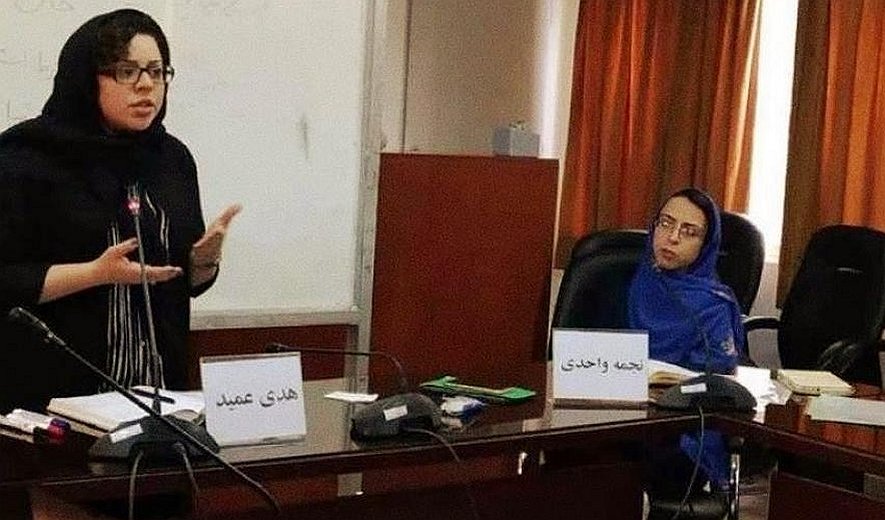Iran Human Rights (IHR) – The Court of Appeals has upheld the 15 year prison sentences issued by the Tehran Revolutionary Court for women’s rights activists, Hoda Amid and Najmeh Vahedi. Women’s rights activists say the Islamic Republic is cracking down on even the “most peaceful” activities that are sanctioned by law.

Branch 15 of the Tehran Revolutionary Court had previously sentenced Hoda Amid to eight years in prison, a two year ban on membership in political and social groups and parties, online, media and broadcasting activities and practicing law, on charges of “collaborating with the hostile American government against the Islamic Republic on women and family issues.” Najmeh Vahedi was sentenced to seven years in prison and a two year ban on: leaving the country, membership in political and social groups and parties, online, media and broadcasting activities, on the same charges.
Branch 36 of the Tehran Court of Appeals has now upheld their sentences while all of Hoda and Najmeh’s activities were within the Islamic Republic’s legal framework.
Speaking to IHR, journalist and women’s right activist, Naeimeh Doustdar said: “The important point in the case of Ms Hoda Amid and Ms Najmeh Vahedi is that even the most peaceful type of activities, that are within the Islamic Republic’s framework and on family issues, are not being tolerated.”
According to Ms Doustdar, the interpretation of their activities are contrary to the actual nature of their activities: “These two women’s activists were running legally sanctioned workshops teaching women how to incorporate the terms of their religious engagement into their marriages. The result of which would have been a reduction in women’s rights violations due to marriage inequality and perhaps helped strengthen their marriages in some ways. But this has been interpreted as collaborating with the hostile American government and criminalised.”
Hoda Amid and Najmeh Vahedi were arrested in their homes by security forces on 1 September 2018 and spent more than two months in the IRGC’s 2A security ward before eventually being released on bail. Their arrests were met with a wave of condemnations by civil activists both inside and outside of Iran.
The two women’s rights activists were tried and sentenced by Judge Salavati sitting at Branch 15 of the Tehran Revolutionary Court on 31 October 2020. According to human rights sources, citing “insufficient time to declare representation,” the appeals court had denied their new lawyers access to their case file.
Hoda Amid, a lawyer and Najmeh Vahedi, a sociologist who is currently studying for her postgraduate degree in women’s studies are facing heavy sentences simply for raising awareness about women’s rights.
Speaking about the recent history of the women’s rights movement in Iran, Ms Doustdar says: “For at least two decades, women’s rights activists have been under constant attack, so much so that almost all of the well-known figures are either under pressure or heavy sentences.”
The journalist says any activity in any shape or form, whether legal or social campaigns, have always been suppressed in the same way, causing a lot of the activists to escape the country.
According to the verdict, by holding educational marriage workshops on “terms of marriage” and “dowry and housework”, the two women were working “in line with the project of infiltration by weakening the foundation of the family with the aim of overthrowing (the government)” and “collaborating with the hostile America against the Islamic Republic on women and family issues.”
Naeimeh Doustdar, however, believes that their activities that empower women, conflict with the Islamic Republic’s goals for women: “The result of empowering women will be something that is incompatible with the Islamic Republic’s ideology and the image they wish to portray of a Muslim and Iranian woman. Empowering women, eliminating discrimination, greater use of economic resources, higher political participation, equal employment and similar issues are incompatible with the image they want to portray of women.”
She further considers the government’s efforts to “preserve the stereotype of a Muslim woman” as one of the main reasons for the crackdown on women’s rights activists: “Through new laws, the Islamic Republic is trying to promote female stereotypes, by highlighting social taboos they seek to bring women back to the home, raising children and maintaining the family unit. What the women’s rights activists are doing contradicts this picture. In order to preserve the stereotype of the Muslim woman, they crackdown on any woman demanding their rights in any way, anyone reminding the women of their rights or trying to secure them in any way.”
 Shabtabnews In this dark night, I have lost my way – Arise from a corner, oh you the star of guidance.
Shabtabnews In this dark night, I have lost my way – Arise from a corner, oh you the star of guidance.


